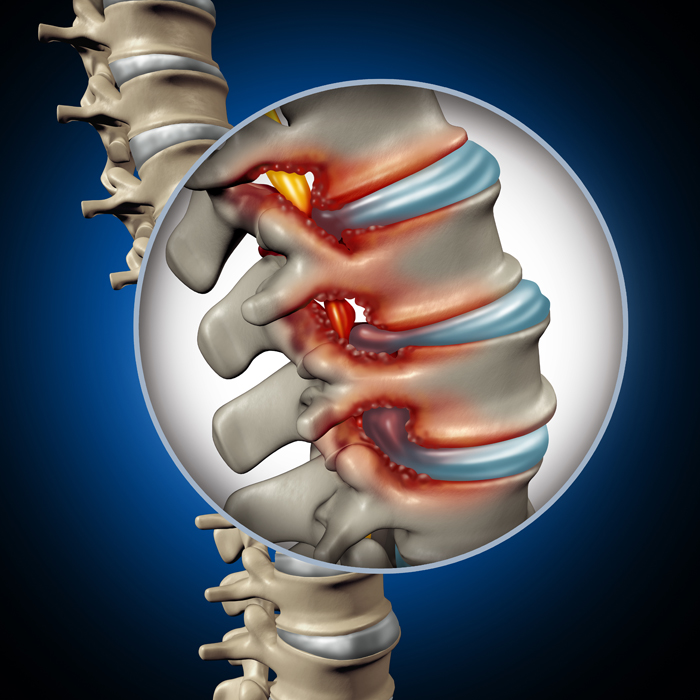Spinal Stenosis Treatment in Chunni-ganj, Kanpur
Spinal Stenosis is a common condition found in people who are over 60 years of age. The condition occurs when the spinal cord in the neck or the spinal nerve roots in the lower back are compressed. Spinal Stenosis can happen in any part of the Spine but it is common in the lower back.
In layman's words, this condition refers to the process of narrowing that chokes the spinal nerves. This is caused due to aging and can be partially cured by Spinal surgery after the doctor’s recommendations only. The symptoms develop gradually and can lead to chronic pain and muscle weakness over the period.

Symptoms of Spinal Stenosis
Spinal stenosis can usually be diagnosed at Apollo Spectra, Kanpur, with a thorough clinical history and examination of the patient. It is then confirmed with an MRI or a CT scan. When people cross the age of 50, they likely experience joint pains or weakness in their bodies. But to declare if they are suffering from Spinal Stenosis or not, it is best to look for the below symptoms:
Symptoms of spinal stenosis in the neck -
- Tingling sensation or numbness in a foot, leg, hand, or arm
- Weakness in a foot, leg, hand, or arm
- Balance problems
- Difficulty walking
- Neck pain
- Bowel or bladder dysfunction in severe cases
Symptoms of spinal stenosis in the lower back -
- Numbness or tingling sensation in a leg or foot
- Weakness in a leg or foot
- Pain or cramping in one or both legs, especially when you stand for long or while walking
- Back pain
Treatment of Spinal Stenosis
There are different methods for Non-Surgical treatments for Spinal Stenosis. For patients over the age of 60, medics usually advise physical therapy, pain medication, and epidural injections only, as there are huge risks of surgery.
Below are some of the treatments which are used to cure Spinal Stenosis:
- Physical Therapy
- Activity Modification
- Epidural Steroid Injections
Spinal Stenosis Surgery
There are several surgical options for spinal stenosis. Spinal Stenosis Surgery at Apollo Spectra, Kanpur, involves the removal of bone spurs, degenerated discs, or soft tissues that were compressing the spinal nerve. In some cases, the surgery involves the fusion of the adjacent vertebrae into the spinal cord also.
Below are some of the surgeries operated on during Spinal Stenosis:
- Laminectomy
- Foraminotomy
- Discectomy and Fusion
- Microendoscopic decompression
- Interspinous process spacers
- Corpectomy
Risks Involved in Spinal Stenosis Surgery
Patients who are not able to benefit from the nonsurgical treatment, are only advised to undergo spinal stenosis surgery. As with any surgery, there are risks for operating Spinal Stenosis Surgery:
- Infection
- Excessive bleeding
- Allergic reaction
- Permanent Nerve or spinal cord damage
Spinal Stenosis Recovery
After the surgery, patients are monitored for a couple of weeks to ensure a healthy recovery.
Below are some points to note after the surgery:
- Daily walking is strongly encouraged.
- It is admissible to require help for the next couple of weeks.
- Do not drive, go shopping or do any domestic tasks for a couple of weeks.
- Indulge in simple Yoga activities to maintain good core strength with strong back and belly muscles, as well as the flexibility of the legs and trunk.
Conclusion
Approximately 250,000-500,000 Americans have symptoms of spinal stenosis due to degeneration. This represents about 5 of every 1,000 Americans over 50. It is a fairly common problem in elderly people.
Most people do not have surgery to correct spinal stenosis and their symptoms either resolve or they learn to live with them. However, there is a risk of possible paralysis if not checked in due time.
Surgery is only recommended after a doctor's prescription and in extreme cases. Most of the cases with Spinal Stenosis are tolerable and only require physicians to deal with it. It is advised to check with an Expert first before coming to any conclusion.
Request an appointment at Apollo Spectra Hospitals, Kanpur
Call 1860-500-2244 to book an appointment
No, it is likely to say that once a person is diagnosed with Spinal Stenosis, then there is no going back. People with this condition have to either learn to live with it or undergo surgery.
. Spinal surgery can take anywhere from 1-8 hours depending on what is being done. A discectomy or laminectomy can usually be done in one to 3 hours depending on the complexity.
Spinal stenosis is generally not progressive. The pain will come and go, but it usually does not progress with time.
Symptoms
Our Top Specialities
NOTICE BOARD
CONTACT US
CONTACT US
 Book Appointment
Book Appointment


.svg)
.svg)
.svg)
.svg)








